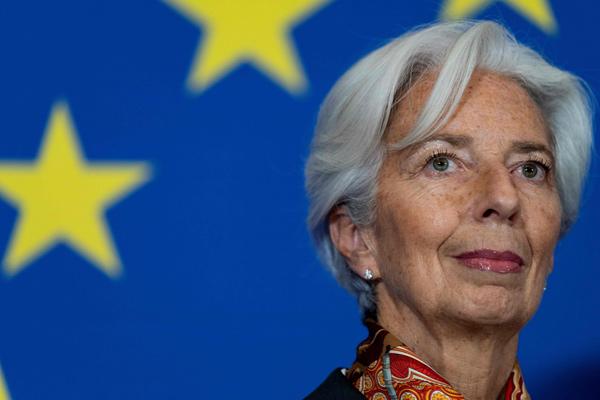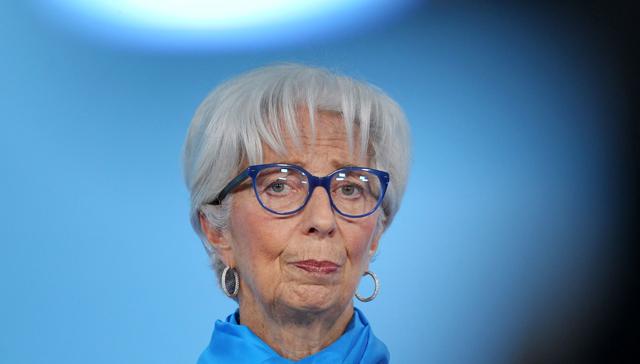You are here
Inflation, climate, jargon: ECB launches major review
By AFP - Dec 09,2019 - Last updated at Dec 09,2019

This photo taken on December 1, shows the President of the European Central Bank Christine Lagarde during a press conference at the House of European History in Brussels to celebrate the 10th anniversary of the Lisbon Treaty (AFP file photo)
FRANKFURT AM MAIN — The European Central Bank's (ECB) new President Christine Lagarde has announced that the Frankfurt-based institute will soon undertake a strategic review, its first since 2003.
Here is how the ECB's strategy has developed over the years and what has prompted the decision to reassess it.
What is the ECB strategy now?
The ECB's overriding mandate is to ensure price stability.
In 2003, its main decision-making body, the governing council, defined that goal as an inflation rate of "just below, but close to" 2 per cent, a level that would encourage investment and employment, while warding off deflation.
Nevertheless, inflation has remained stubbornly low at around 1 per cent, a phenomenon that has left many economists around the world scratching their heads.
Different theories have been put forward as to a possible explanation, from the rise of the casual "gig" economy or the suppression of workers' earnings through globalisation, to political shocks, such as trade tensions and Brexit.
There have been increasing calls for the central bank to rethink the inflation target and the issue is certain to feature highly on the ECB's review, which is expected to take many months.
At the same time, the ECB is under pressure to do more to tackle climate change and wealthier countries like Germany see the review as a chance to call into question the ECB's ultra-expansive policy.
They have long argued that the bank's record-low — and even negative — interest rates, as well as its massive "quantitative easing" bond-buying programme, are detrimental to savers and help accentuate asset price bubbles.
The review will be "an ideal opportunity for Christine Lagarde to reflect on the unconventional crisis measures adopted over the past decade", Pictet Wealth Management strategist Frederik Ducrozet said.
The aim should be "not to 'reset' monetary policy, but give it a new launching point for the coming eight years" of her mandate, he said.
A change in the definition of the inflation target to "around" 2 per cent, instead of "just below", would be "desirable and plausible, if only to make forecasts simpler and more credible", Ducrozet said.
Meanwhile, environmentalists are lobbying the ECB intensively to green both its own operations and its investments in the wider economy through its bond-buying scheme.
Lagarde acknowledged last week that "the ECB's mandate is not climate change", but said climate risks could be built into its economic forecasting and other aspects of its work, such as banking supervision, without compromising the price stability target.
Clearer communication
Until now, ECB meetings have been shrouded in more secrecy than those of other central banks, with an "account" published only weeks later that neither names participants, nor reveals the voting record of individual governing council members.
"We think the bank may move to a more transparent and systematic process of voting on major policy decisions," said Capital Economics analyst Andrew Kenningham.
The debate has been given fresh urgency following the decision by the ECB's governing council in September to restart a bond-buying scheme, which led to a rare public row where dissenters aired their grievances in the media.
Lagarde has also vowed to bring the ECB closer to the public by ditching some of the bank's seemingly impenetrable jargon, where a single word can move markets, but remain incomprehensible to outsiders.
Lagarde has said she wants to "dust off" the bank's language to help citizens understand "what the ECB is for".
Related Articles
FRANKFURT AM MAIN — Two Greenpeace activists paraglided onto the roof of a European Central Bank (ECB) building in Frankfurt on Wednesday, a
FRANKFURT — European Central Bank (ECB) President Christine Lagarde said on Monday she would not "venture" into speculation over interest ra
FRANKFURT AM MAIN — A resurgence in the coronavirus pandemic and a bumpy start to vaccination drives are likely to weigh on the minds of Eur














